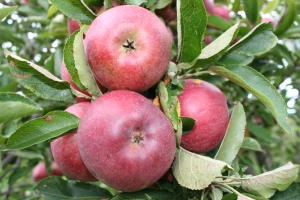A mouth watering look at Kansas grown produce.
For some Midwest farmers agriculture is not about amber waves of grain, but rather the fruitful plains.
Nestled near the Kansas River just east of Topeka is a fruit farm with roots deeper than the apple trees they grow. The sole survivor of an area that once bustled with fruit and vegetable production, Rees Fruit Farm has more than 100 years of experience under their belt and is still going strong.
“As long as there have been Kansas farms, there have been Kansas orchards,” says Rex Rees who owns and operates the farm with his wife, Shannon. “It has its challenges but you just have to find a way to adapt.”
Their farm consists of roughly 5,000 fruit trees including 19 varieties of apples and 14 varieties of peaches. Cherries, grapes, tomatoes, asparagus, pumpkins, blackberries and a plethora of other fresh produce and goods can be found in the Rees Fruit Farm market.
The establishment is also home to award winning apple cider and the original Sweet Apple Cider Slush, a trademark of Rees Fruit Farm that continues to be a top seller.
How did the farm keep going through the years when other didn’t? Rex says it was a combination of things—including luck. “We’ve always had a retail market” he says. “We have a good location; close to the city but on a side that is less developed. The land isn’t so valuable that we can still afford to farm it.” Another key ingredient to success: satisfied customers. “We’re always trying new things to keep up with trends, and keep people coming back.”
Growing fruits and vegetables in the Midwest is not always easy. Like every farm, they must deal with what they’re dealt and in some years that means turbulent growing conditions. High temperatures, low temperatures, humidity, insects, disease; it’s not the most ideal place to grow—but it works. “The thing about locally grown produce is that it doesn’t look like what you get at the grocery store, but the taste is so much better,” Rex says. “Our tomatoes may not be identical and flawless, but they taste delicious and that’s what matters most.”
Consumers craving locally grown produce are seeking out fresh fruit stands and farmers markets like never before to have a taste. In 1987 (the first year markets were surveyed) Kansas was home to 26 farmers markets. Today that number has almost tripled to the current census of 80 markets statewide.
The USDA reports that nation wide numbers have more than doubled — to more than 4,685 markets. In excess of 3 million consumers shop and more than 60,000 farmers sell at these markets annually. It’s also estimated that these markets generate more than $1 billion in consumer spending each year.
“Organic foods are gaining popularity but as demand outstretches production consumers look for the next best thing, and that’s locally grown,” Rex says. “I think people have always wanted to buy locally but they didn’t know how or where and farmers markets are providing that place.”
A surge of support for farmers markets is swelling. Governor Mark Parkinson declared August “Kansas Farmers Market Month” and Secretary of Agriculture, Josh Svaty, challenged Kansans to add more locally grown foods to their menus.
In addition, 11 Kansas farmers markets now accept Vision Cards, the Electronic Benefits Transfer method for the Supplemental Nutrition Assistance Program (SNAP) also known as the Food Assistance Program in Kansas.
Kansas Rural Center Farmers Market Project Coordinator Mercedes Taylor-Puckett says Kansans spend over $520 million on fruits and vegetables. But less than 3% of produce comes from local farms and producers. Localizing just 10% of fruit and vegetable spending would generate over $52 million for the local economies and communities.
Rees Fruit Farm was not quick to dive into the farmers market scene. “Six years ago we were selling our produce to other people who would then take it to markets and sell it themselves,” Rex says. “We realized that there really was something to it and we were missing out by not being there, so we incorporated that into the business” Since that time Rees Fruit Farm has doubled their revenue at the markets each year, and Rees produce can be found at five different markets in the area with more yet to come.
At farmers markets, growers like Rex get to experience a side of crop marketing unfamiliar to most Midwest farmers. “We get to set our own prices, if the price is too high customers will let you know but we have the freedom to establish the price ourselves based on supply, demand and quality,” Rex says. “We also have the opportunity for immediate feedback from our customers. Most farmers don’t get to meet the person who buys or eats their corn or soybeans. We have the chance to have that type of relationship.”




No comments:
Post a Comment